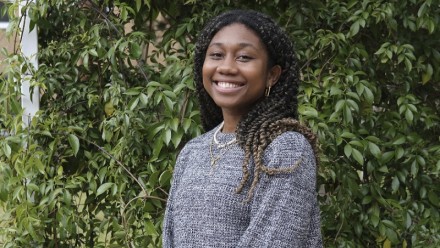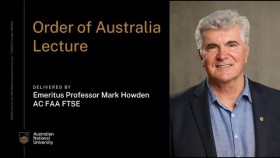Lessons from vibrant cultures to the halls of Crawford
Meet Adubi Plange, Crawford’s Master of Climate Change graduate and the advocate for decolonization and environmental justice. She navigates the intersections of policy and education, poised to shape a profound impact on our collective future with a deep commitment to Indigenous knowledge and sustainability.
Adubi’s experiences and values have been profoundly shaped by growing up in Suva, Fiji, and coming from a rich blend of cultures. Rooted in the importance of community and traditional knowledge, instilled by her Indigenous Fijian heritage, and influenced by the hard work and dedication of her Ghanaian family, education became a cornerstone of Adubi’s life. A dedication to decolonizing education spaces, valuing Indigenous knowledge, and promoting justice and equity has been the driving force behind her motivation and the foundation of her career aspirations in environmental studies.
Choosing to pursue a Master of Climate Change at the ANU Crawford School of Public Policy, Adubi sought to deepen her understanding of the interplay between climate change science and policy. Her undergraduate studies in International Relations highlighted the significant political dimensions of environmental issues, sparking her interest in environmental policy. “My dad mentioned the Crawford school to me (many, many times) because he knew I was interested in the policy side of things. After some research, I found the Masters of Climate Change degree and knew immediately it was what I wanted to do,” Adubi said.
At Crawford, she was able to explore other passions in related fields including financing loss and damage, disaster risk reduction, long-term adaptation, and forced relocation. Embracing the diverse range of topics offered by the degree, Adubi sought to expand her knowledge and make meaningful contributions across multiple areas.
Experiences with local policy issues gained throughout her studies have deepened Adubi’s understanding of the challenges faced in global policy. Recognizing the interconnections, she believes that future endeavours in public policy should prioritize collective action, addressing climate change and environmental justice from a holistic perspective. Policymakers in Australia and the region should focus on fostering resilience, promoting sustainability, and amplifying the voices of marginalized communities.
Reflecting on her time at Crawford, the most memorable aspect has been the exceptional teachers who shared their wealth of firsthand experience and expertise. “The teachers I had the privilege of learning from were incredible, as were the classes and the great content. The teachers were my highlight, so many of them who are still directly involved in the IPCC and with the Pacific Island states and their climate action journeys like Dr Ian Fry, Professor Mark Howden, Dr Siobhan McDonnell and others,” she added.
Adubi offers valuable advice to prospective students considering studying at Crawford: “Learn as much as you can from the teachers around you, and attend the events and symposiums!”
Adubi envisions making direct contributions to adaptation initiatives in the Pacific following graduation. Additionally, she is contemplating the prospect of pursuing a PhD centred on exploring gendered experiences in Indigenous knowledge.
From all of us at Crawford: Congratulations, Adubi!
This item was originally published by the Crawford School of Public Policy: ANU College of Asia & the Pacific.











